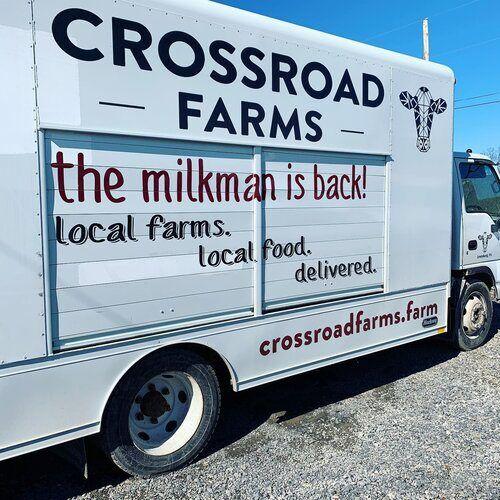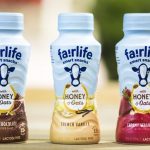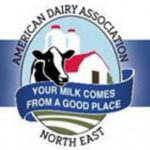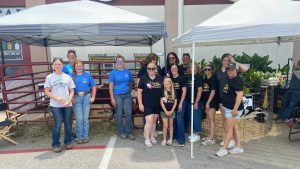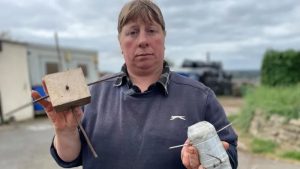
His wife, Alison Steibe, had been struggling with Crohn’s disease and couldn’t tolerate traditional dairy products.
Her doctors suggested that she try milk with the A2 protein. A2 milk may be more digestible than standard milk, which has the A1 protein, Midkiff said.
So following the advice of her doctors, Steibe tried A2 milk and didn’t have any problems. Soon, the only milk in the family’s refrigerator was A2, but Midkiff still had a barn filled with cows carrying the A1 gene.
Seeing how well his wife responded to A2 milk, Midkiff started thinking about making a change.
“When you have a disease like Crohn’s in your family, it makes it more real,” he said. “The more I researched A2 milk, the benefits were true, not just an opinion. It gave me something I could believe in and something I thought I could sell.”
A barn fire in 2018 hastened Midkiff’s decision to transform his Crossroad Farms dairy operation, and at the beginning of 2019 he began to shrink his milking herd of 110.
He switched his herd bull to a Jersey that had the A2 gene, and he had his cows genomically tested. Those with the A1 gene were culled as they freshened, and the A2 cows — mainly Jerseys, Jersey crosses and Linebacks — remained.
He bought other A2 cows to augment the herd, which numbers 38 today.
A2 Milk Paying Off
While the herd shrank, the couple’s future in the dairy business grew.
In July 2020, they stopped shipping conventional milk and began selling their own A2 milk through stores, restaurants and a home delivery business.
Midkiff and Steibe also built a creamery and bottling facility on the farm, cementing their direct-to-consumer sales. Any milk that’s left over is used for cheese.
Today, Midkiff said, he’s realizing a gross return of $112 per hundredweight for his milk, making the decision to reduce the herd financially sound.
“Downsizing the herd is key. It’s a business, and it allows me to dedicate my time to where I make money rather than spend money,” he said. “As a first-generation dairy farmer, the deck was stacked against me. But this honestly changed my life.”
Still, the move didn’t come without risk.
Because A2 milk is relatively new, Midkiff had to build a customer base by promoting the benefits. Pasteurizing, bottling and delivering milk takes a lot of time and work. Midkiff vat pasteurizes his milk at a lower temperature for a longer time than standard milk, and doesn’t homogenize it, allowing the cream to rise to the top of every glass bottle.
It all ties into the farm’s motto — “The milkman is back.”
“The bulk of our fluid milk sales is home delivery, and we’re a throwback in that regard,” Midkiff said. “But we really had to be ambitious in education and marketing of the A2 milk.
“A lot of people think they’re lactose intolerant, and I’ve had customers ask if we can take the lactose out of our milk. I give them a free sample of the A2, and they come back and buy more.”
Taking the Herd in a New Direction
While Midkiff and Steibe do their part to market their milk, the basis of the farm’s success is the cows.
Midkiff keeps them on pasture all summer and into the fall. He feeds a diet primarily of grass forages with 4 pounds of grain per cow daily. Midkiff eliminated corn silage from his ration — a move that he said improved milk quality and the operation’s bottom line.
“It takes a lot of time and expense to store it, and on the consumer side, you can taste the corn silage in milk,” Midkiff said. “Corn silage is good feed for making 100-pound milk, but that’s not what we’re going for.”
What he has, however, is a herd averaging 4.9% butterfat and fluid milk that is so thick that Midkiff added Linebacks in with the Jerseys to prevent the milk from getting too creamy.
“Because it’s not homogenized, the cream will rise to the top, so you still have to shake it,” he said. “We’ve had to educate people about how cream naturally rises. Many of them don’t know about that anymore.”
Now that the A2 herd is established and the farm has a customer base for the milk, Midkiff is ready to build things back up. He’d like to bring the herd up to 60 cows by the end of 2021, and is considering the addition of a robotic milking system.
Midkiff said he wouldn’t have lasted in the dairy industry if he hadn’t transitioned to A2, and he considers the niche product something that could save small family dairy farms.
Since A2 milk is thought to be easier to digest for some people, there is a consumer market offering dairy plenty of room to grow, he said.
“For dairy to succeed, we have to make a product that people can drink,” Midkiff said. “I don’t think we should be fighting the facts when it comes to A2.”
And the customers agree.
Matt Detrick of Drums, Luzerne County, buys A2 milk at the nearby Market at Rinehimer Farms, which sells Crossroad Farms milk. Detrick said his wife always had mild issues with dairy, but hasn’t had any problems since switching to A2 milk.
“We like the fact that they feed their cows naturally, and the milk just feels like it’s thicker,” Detrick said. “And I really like that it’s not homogenized because those fat chains in milk aren’t supposed to be broken up.”
Randi Rinehimer, who owns the market with her husband, Gary, said the A2 milk has been well-received by their customers.
“There’s more interest in it than we thought,” she said. “We’ve had customers who couldn’t use dairy, but they’re able to drink this. With A2, they now have an option.”
When it comes to options, Midkiff and Steibe aren’t limiting their offerings to A2 milk. Part of their mission, Midkiff said, is to not only sell their own products but also to act as an avenue for other local farmers to reach consumers who don’t want to rely on big grocery stores.
Crossroad Farms sells and delivers produce, beef and pork from area farms in addition to its own milk. The concept was derived from the food distribution issues at the beginning of the pandemic.
“COVID-19 really showed how insecure our food supply is, and those people who were used to buying in a grocery store are now looking toward the small farm for their food,” Midkiff said. “The situation has given small farms an opportunity, and we want to help make that connection.”
